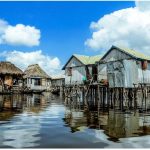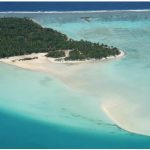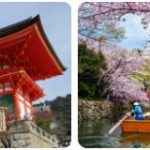Niue: entry and exit regulations
Formalities, visas
Tourists need a passport that is valid for 6 months beyond the intended departure date and a return or onward flight ticket.
Sufficient financial means are also required for the stay.
An entry permit is issued for a period of up to 30 days upon entry.
This can be extended at the following address:
Immigration Office Administration Blocks P. O. Box 67AlofiTel: (00683) 4122Fax: (00683) 4150
Import and export of goods
Duty-free
People over the age of 18 may import the following duty-free:
200 cigarettes or 227 g tobacco or 50 cigars, 3 bottles of alcohol, a maximum of 3 liters.
Goods that exceed the value of $ 50 NZ must be declared. It is not allowed to bring in food.
Import and export of foreign currency
- Local currencyThere are no restrictions
- Foreign currenciesThere are no restrictions
Departure fee
In many countries, a fee must be paid when leaving the country. This fee is $ 25 NZ when leaving Niue.
Niue: arrival and transport
How to get to Niue
Niue has an airport, Hanan International Airport (IUE). This is about 7 km north of Alofi. It is served by Polynesian Airlines twice a week from Auckland, New Zealand or Apia (Samoa). Since November 2005, Air New Zealand has served Niue once a week, on Fridays from Auckland.
On Saturdays the flight leaves Niue back to Auckland. If you fly in from Auckland, you will fly over the date line!
Travel in the country
There is no public transport system in Niue. But you can rent bicycles, scooters, motorcycles and even cars. Taxis are also available. Most tourists, however, rent a bike.
Roads
Niue has around 230 km of roads, 90 km of which are paved.
International license plate
Niue’s international license plate is:
| NZ |
Niue: Embassies, consulates and tourist office
The island’s only foreign mission is in New Zealand.
Niue High Commission 101 Molesworth Street, Molesworth House Wellington (New Zealand) : PO Box 12048 Wellington (New Zealand) Tel: 0064 – (0) 4 – 499 4515 Fax: 0064 – (0) 4 – 499 4516 Email: komisina@niuhicom.co .nz
German representations in Niue
Embassy
The Federal Republic of Germany does not have its own embassy on Niue. The embassy in Wellington, New Zealand is responsible.
German Embassy in Wellington Hobson Street 90-92 Thorndon 6011, Wellington: Embassy of the Federal Republic of Germany PO Box 1687 Wellington 6140 New Zealand Tel: 0064 – (0) 4 473 60 63 Fax: 0064 – (0) 4 473 60 69 Email: info@wellington.diplo.de www.wellington.diplo.de
The German embassy in Wellington is still responsible for:
- American Samoa
- Cook Islands
- Fiji Islands
- Kiribati
- Niue
- Pitcairn
- Samoa
- Tonga
- Tokelau
- Tuvalu
Swiss representation in Niue
Embassy
Switzerland does not have its own embassy on Niue. The embassy in Wellington, New Zealand is responsible.
Embassy, Embassy of Switzerland in Wellington
10 Customhouse Quay, Level 12
6140 Wellington:
PO Box 25004
6146 Wellington
Tel: 0064 – (0) 4 – 472 1593
Fax: 0064 – (0) 4 – 499 6302
Email: wel.vertretung@eda.admin.ch
http://www.eda.admin.ch/wellington
In addition to New Zealand, the Swiss Embassy Embassy in Wellingtion is also responsible for:
- Cook Islands
- Fiji Islands
- Samoa
- Tonga
- Tokelau
Tourist office
Niue Tourism Office
Commercial Center
Alofi, Niue Island
:
PO Box 42
Alofi, Niue Island
Tel: 00683 – 4224
Fax: 00683 – 4225
Email: niuetourism@mail.gov.nu
www.niueisland.com
Niue: Travel Medicine, Risks
Infectious Diseases
In Niue, the following illnesses, which do not occur or only occur sporadically in Germany and Northern Europe, mainly due to contaminated water and various foods:
- Malaria, there is no risk of malaria.
- Dengue fever
- various intestinal diseases such as amoeba, shigella, worm infestation, lamblia or salmonella
- Filariasis
- Hepatitis A
- Typhoid, only in travelers who may come into contact with polluted water or contaminated food.
The following vaccinations are recommended:
- Diphtheria, a vaccination against diphtheria should always exist, also in the home country.
- Hepatitis A
- Tetanus, a vaccination against tetanus should always exist, also in the home country.
- Typhoid, only in travelers who may come into contact with polluted water or contaminated food.
Compulsory vaccination
As already mentioned above, there are no vaccination requirements when entering or staying in the country.
Who pays for vaccinations in Germany?
Most children in Germany are vaccinated against a number of infectious diseases at an early age. However, the vaccination protection only lasts up to 10 years, in some cases even shorter. Therefore, before traveling abroad, you should carefully consider against which infectious diseases a vaccination is necessary or useful in the country concerned and whether the vaccination protection, if applicable, was not too long ago.
Most statutory health insurances have been reimbursing the costs for the following vaccinations since June 2007.
There is even no 10 € practice fee – but the insured usually have to pay the statutory co-payment, which is 10% of the vaccine price – that is at least 5 € and a maximum of 10 €. Under these conditions, the following vaccinations are free of charge:
- cholera
- diphtheria
- Early summer meningoencephalitis (TBE)
- Yellow fever
- Hepatitis A and B
- Meningococcal meningitis
- Pneumococci
- Polyo (polio)
- Tetanus (tetanus)
- rabies
- typhus
Some health insurance companies also reimburse the cost of malaria prophylaxis.
As a rule, private health insurance companies (inquire beforehand) also cover the costs mentioned.
Hazards/current warning notices
Foreign Office of the Federal Republic of Germany
Citizens’ Service
Telephone: 0049 – (0) 30 – 5000 – 2000
Fax: 0049 – (0) 30 – 5000 – 51000
Current warning notices:
www.auswaertiges-amt.de
Niue: Currency, Exchange Rate and Shopping
The national currency of Niue is the
New Zealand dollar NZD.
Exchange rate
You can find a currency converter here:
www3.forium.de
Bank opening hours
Monday – Friday: 9:00 a.m. – 3:00 p.m.
Shop
Shop opening times
Monday – Friday: 8:00 a.m. – 4:00 p.m.
as well as Saturday mornings and late Saturday afternoons.
Cheap or country-specific goods, souvenirs,
handicrafts made from plaited pandan nut leaves, e.g. B. hats.








